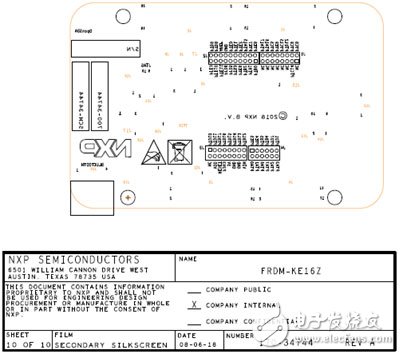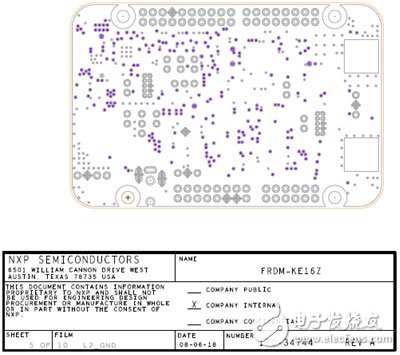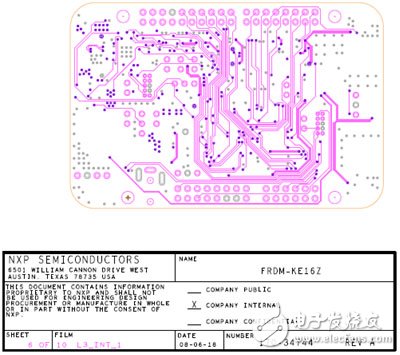

基于48MHz Arm® Cortex®-M0+ MCU的微控制器
电子说
描述
nxp公司的KE1xZ64是基于48 MHz Arm® Cortex®-M0+ MCU的微控制器,提供多达64KB闪存,多达8KB RAM以及完整的模拟/数字特性,并具有用于工业网络强健的触摸感应接口(TSI)和CAN总线,在定制的家用电器触摸UI和工业控制系统提供高度稳定性和精确度。其ARM CortexR-M0+核基于ARMv6架构和ThumbR-2 ISA,支持高达48MHz频率,具有可配置嵌套矢量中断控制器(NVIC),存储器映射除法和平方根模块(MMDVSQ),电源管理控制器(PMC)具有多种模式:运行,等待,停止,VLPR, VLPW和VLPS;工作电压2.7V-5.5V,环境温度–40 到105℃,主要用在消费类电子,工业控制和工业网络。本文介绍了KE1xZ64主要特性,功能框图和系统框图,时钟框图,以及评估板FRDM-KE16Z主要特性,框图和电路图和PCB设计图。
Providing up to 64 KB flash, up to 8 KB RAM, and a complete setof analog/digital features, KE1xZ64 offers a robust Touch SenseInterface (TSI) and CAN bus for industrial networking, whichprovides high-level stability and accuracy in customer ’s homeappliance touch UI and industrial control systems.
KE1xZ64主要特性:
Core Processor and System
• ArmR CortexR-M0+ core, supports up to 48 MH***requency
• Arm Core based on the ARMv6 Architecture andThumbR-2 ISA
• Configurable Nested Vectored Interrupt Controller(NVIC)
• Memory-Mapped Divide and Square Root module(MMDVSQ)
Reliability, safety and security
• Cyclic Redundancy Check (CRC) generator module
• 128-bit unique identification (ID) number
• Internal watchdog (WDOG) with independent clocksource
• External watchdog monitor (EWM) module
• ADC self calibration feature
• On-chip clock loss monitoring
Power management
• Low-power Arm Cortex-M0+ core with excellent energyefficiency
• Power management controller (PMC) with multiplepower modes: Run, Wait, Stop, VLPR, VLPW andVLPS
• Supports clock gating for unused modules, and specificperipherals remain working in low power modes
• POR, LVD/LVR
Memory and memory interfaces
• Up to 64 KB program flash
• Up to 8 KB SRAM
• 64 Bytes flash cache
Mixed-signal analog
• 1× 12-bit analog-to-digital converter (ADC) with upto 16 channel analog inputs per module, up to 1Msps
• 1× high-speed analog comparators (CMP) withinternal 8-bit digital to analog converter (DAC)
Timing and control
• 2× Flex Timers (FTM) for PWM generation, offering6ch+2ch
• 1× 16-bit Low-Power Timer (LPTMR) with flexiblewake up control
• 1× Programmable Delay Block (PDB) with flexibletrigger system
• 1× 32-bit Low-power Periodic Interrupt Timer (LPIT)with 2 independent channels
• Real timer clock (RTC)
Debug functionality
• Serial Wire Debug (SWD) debug interface
• Debug Watchpoint and Trace (DWT)
• Micro Trace Buffer (MTB)
Clock interfaces
• OSC: high range 4 - 40 MHz (with low power or highgainmode) and low range 32 - 40 kHz (with high-gainmode only)
• 48 MHz high-accuracy (up to ±1%) fast internalreference clock (FIRC) for normal Run
• 8 MHz / 2 MHz high-accuracy (up to ±3%) slow internalreference clock (SIRC) for low-speed Run
• 128 kHz low power oscillator (LPO)
• Low-power FLL (LPFLL)
• Up to 50 MHz DC external square wave input clock
• System clock generator (SCG)
• Real time counter (RTC)
Human-machine interface (HMI)
• Supports up to 32 interrupt request (IRQ) sources
• Up to 42 GPIO pins with interrupt functionality
• Touch sensing input (TSI) module
Connectivity and communications interfaces
• 3× low-power universal asynchronous receiver/transmitter (LPUART) modules with FIFO supportand low power availability
• 1× low-power serial peripheral interface (LPSPI)modules with FIFO support and low poweravailability
• 1× low-power inter-integrated circuit (LPI2C)modules with FIFO support and low power availability
• 1× CAN module (MSCAN), with 5 Rx buffers and 3Tx buffers
Operating Characteristics
• Voltage range: 2.7 to 5.5 V
• Ambient temperature range: –40 to 105℃

图1.KE1xZ64功能框图
Kinetis KE1xZ64子系列产品

图2.Kinetis KE1xZ64系统框图

图3.Kinetis KE1xZ64时钟框图
评估板FRDM-KE16Z
The FRDM-KE16Z Freedom board is designed to work in standalone mode oras the main board of FRDM-TOUCH, FRDM-MC-LVBLDC, and Arduinoboards. The FRDM-KE16Z Freedom board is a modular development platformthat enables rapid prototyping and tool reuse through reconfigurable hardware.
评估板FRDM-KE16Z主要特性:
• MKE16Z64VLF4 MCU (Arm? Cortex?-M0+ core, 48 MHz clock, 64 KBFlash, 8 KB RAM, 48 LQFP package)
• I/O headers for easy access to MCU I/O pins
• Compatible with FRDM-TOUCH, FRDM-MC-LVBLDC, and Arduinoboards
• On-board debug circuit: MK20DX128VFM5 (OpenSDA) with virtual serialport
• NXP inertial sensor, FXOS8700CQ
• Reset pushbutton, two user buttons, and one RGB LED
• Touch electrodes in self-capacitive mode
图4.评估板FRDM-KE16Z顶层外形图

图5.评估板FRDM-KE16Z框图
The FRDM-KE16Z features the KE16Z64VLF4 MCU. This 48 MHz microcontroller is part of the Kinetis KE+ family and isimplemented in a 64 LQFP package.
评估板FRDM-KE16Z MCU主要特性:
• 32-bit Arm Cortex-M0+ core, 48 MHz
• Memories
— 64 KB flash
— 8 KB SRAM
• Clocks
— Clock generation module with FLL for system and core clock generation
— 48 MHz high accuracy fast internal reference clock (FIRC)
— 8 MHz/2 MHz high accuracy slow internal reference clock (SIRC)
— 4-40 MHz fast external oscillator (OSC)
— 128 KHz low-power oscillator (LPO)
— Low-power FLL (LPFLL)
• Analog peripherals
— 1 x 12-bit SAR ADC with up to 16 channels input per module
— 1 x high-speed analog comparators (CMP) with internal 8-bit digital to analog converter (DAC)
• Connectivity and communications interfaces
— 1 x low-power serial peripheral interface (LPSPI)
— 1 x low-power inter-integrated circuit (LPI2C) module
— 3 x low-power universal asynchronous receiver/transmitter (LPUART) modules
— 1 x CAN module (MSCAN), with 5 receive buffers and 3 transmit buffers
◦ Timers
— 2 x FlexTimer (FTM) modules
— 1 x 16-bit low-power timer(LPTMR) with flexible wake-up control
— 1 x 32-bit Periodic Interrupt Timer(LPIT)
— 1 x Programmable Delay Block(PDB) with flexible trigger system
— Real-time clock (RTC)
• Human-machine interface (HMI)
— Supports up to 32 interrupt request (IRQ) sources
— Up to 42 GPIO pins with interrupt functionality
— 25-channel touch sensing interface(TSI), supporting both self-capacitive and mutual-capacitive mode
图6.评估板FRDM-KE16Z电路图(1)

图7.评估板FRDM-KE16Z电路图(2)

图8.评估板FRDM-KE16Z电路图(3)

图9.评估板FRDM-KE16Z电路图(4)

图10.评估板FRDM-KE16Z电路图(5)

图11.评估板FRDM-KE16Z PCB设计图(1)

图12.评估板FRDM-KE16Z PCB设计图(2)

图13.评估板FRDM-KE16Z PCB设计图(3)

图14.评估板FRDM-KE16Z PCB设计图(4)

图15.评估板FRDM-KE16Z PCB设计图(5)

图16.评估板FRDM-KE16Z PCB设计图(6)

图17.评估板FRDM-KE16Z PCB设计图(7)

图18.评估板FRDM-KE16Z PCB设计图(8)

图19.评估板FRDM-KE16Z PCB设计图(9)

图20.评估板FRDM-KE16Z PCB设计图(10)

图21.评估板FRDM-KE16Z PCB设计图(11)
详情请见:
https://www.nxp.com/docs/en/data-sheet/KE1xZP48M48SF0.pdf
和https://www.nxp.com/docs/en/user-guide/UM11204.pdf
UM11204.pdf
- 相关推荐
- 热点推荐
- 微控制器
-
STM32C031x4/x6:面向主流应用的Arm® Cortex®-M0+ 微控制器2025-10-27 458
-
雅特力AT32L021系列低功耗ARM®Cortex®-M0+微控制器2025-06-05 2690
-
普冉半导体推出一款基于32位ARM Cortex-M0+内核的微控制器2024-04-30 1752
-
32位 ARM® Cortex®-M0+ 微控制器PY32L020系列数据手册2024-01-19 735
-
32位ARM®Cortex®-M0+微控制器-PY32C642产品介绍2023-09-20 2472
-
CW32L052 ARM® Cortex®-M0+ 32 位低功耗微控制器2023-08-01 649
-
32位ARM® Cortex®-M0+ 微控制器,PY32F002A系列2023-01-30 2709
-
基于Arm®Cortex®-M0+内核的32位微控制器2022-11-24 712
-
32位ARM®Cortex®-M0+内核单片机XL32F003系列MCU2022-11-09 3202
-
CX32L003 ARM® Cortex® -M0+ 32位微控制器数据手册2021-11-01 2273
-
基于ARM Cortex M0的微控制器MM32F013x2021-08-26 1155
-
Holtek推出最新Arm® Cortex®-M0+微控制器HT32F00082018-05-16 1997
-
ARM_Cortex-M0+微控制器原理与应用2016-01-15 735
-
爱特梅尔发布全新ARM Cortex-M0+微控制器系列2013-07-04 1708
全部0条评论

快来发表一下你的评论吧 !

